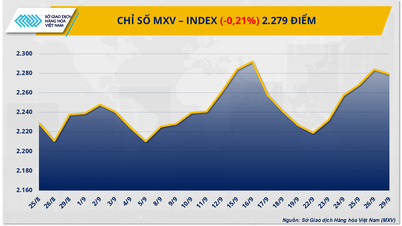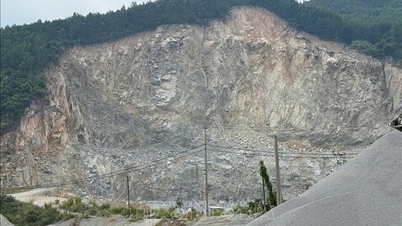Canadian real estate declined sharply in February 2025, greatly affecting the economy and what can Vietnam learn from this fluctuation?
Canada’s real estate market contracted sharply in February 2025, with the largest decline in home sales in nearly three years. Factors such as trade wars, economic and fiscal uncertainty have kept many buyers on the sidelines and not making large transactions amid financial uncertainty. This raises a series of questions about how the real estate market can affect the economy and what lessons Vietnam can learn from this volatility.
Sharp decline in home sales
According to information from the Canadian Real Estate Association (CREA), in February 2025, home sales in Canada fell sharply by 9.8% compared to January, the largest decline since May 2022. At the same time, home sales fell by 10.4% compared to the same period last year. This decline not only reflects buyers' concerns but also shows the difficulty in maintaining stable growth of the real estate market in the context of global and domestic economic factors.
This is partly due to economic uncertainty, particularly the effects of trade wars and other geopolitical factors. This volatility has made consumers and investors more cautious when making major financial decisions such as buying a home.
 |
| In February 2025, home sales in Canada fell sharply by 9.8% compared to January, the largest decline since May 2022. Illustration photo |
In addition to the decline in home sales, the home price index also saw a slight decline. The sector’s home price index fell 0.8% in February, and was down 1% year-on-year. This reflected a market correction after a period of strong growth. Furthermore, the national average selling price fell 3.3% year-on-year, suggesting that the decline was not small, especially for those looking for real estate investment opportunities.
This price adjustment not only reflects a cooling market, but also demonstrates that global economic factors, such as inflation and rising interest rates, have made buyers more cautious. Homebuyers may face higher costs, reducing affordability and influencing their decision to buy a home.
The housing market has not escaped the effects of this decline. Housing starts fell 4% in February from the previous month, to 229,030 units, lower than economists' forecasts of 250,000 units. This shows that weak housing demand and economic uncertainty have impacted decisions to build new homes.
This decline will have a lasting impact on supply and demand in the real estate market, especially when limited supply occurs while housing demand remains high. This is a factor to note for investors and long-term housing development policies.
Lessons for Vietnam
The Canadian real estate market, through its recent sharp decline, has offered some important lessons that Vietnam can learn from:
First, invest carefully and manage risks: The Canadian real estate market has seen a sharp decline due to unstable global economic factors such as trade wars, rising interest rates and geopolitical issues. This has shown the importance of carefully assessing the impact factors before investing in real estate. Vietnam should also be cautious in investing in this market, especially when financial and economic factors fluctuate greatly. Building a reasonable investment strategy, with risk allocation and careful calculation is extremely necessary to avoid serious losses.
Second, be cautious in the decision to buy a house: The situation in Canada shows that uncertain factors in the economy, such as fluctuations in interest rates, credit policies and government regulatory measures, can strongly affect buyers' decisions. Therefore, people and investors in Vietnam also need to pay attention to macro factors that can affect the real estate market, such as bank interest rates and government financial management measures. The decision to buy a house should not be hasty, but should be based on fundamental factors and a thorough analysis of the economic situation.
Third, the impact of fiscal policy: Fiscal policy, especially interest rate policy, plays an important role in regulating the real estate market. In the Canadian market, the increase in interest rates has contributed to reducing the demand for home purchases, because buyers face higher borrowing costs. This is also an important lesson for Vietnam in formulating fiscal policies. Interest rate policy needs to be carefully considered to avoid reducing buyer demand while still ensuring the stable development of the real estate market.
Fourth, sustainable development: Finally, the decline in the Canadian real estate market shows the need to build a sustainable real estate market. A sustainable market requires a balance between supply and demand, avoiding prices being pushed too high by speculative factors. Vietnam can learn from these experiences to develop a stable real estate market, ensuring long-term value without being dominated by short-term factors or the impact of unpredictable economic fluctuations.
| The Canadian real estate market, after a sharp decline, has provided valuable lessons for Vietnam, helping it to be aware of fluctuations and adjust its strategies accordingly. Vietnam can learn from these experiences, especially in risk management and the development of a sustainable and stable real estate market. |
Source: https://congthuong.vn/bat-dong-san-canada-xuong-day-3-nam-va-bai-hoc-cho-viet-nam-378814.html


![[Photo] National Assembly Chairman Tran Thanh Man chairs the 8th Conference of full-time National Assembly deputies](https://vphoto.vietnam.vn/thumb/1200x675/vietnam/resource/IMAGE/2025/9/29/2c21459bc38d44ffaacd679ab9a0477c)


![[Photo] General Secretary To Lam receives US Ambassador to Vietnam Marc Knapper](https://vphoto.vietnam.vn/thumb/1200x675/vietnam/resource/IMAGE/2025/9/29/c8fd0761aa184da7814aee57d87c49b3)
![[Photo] General Secretary To Lam attends the ceremony to celebrate the 80th anniversary of the post and telecommunications sector and the 66th anniversary of the science and technology sector.](https://vphoto.vietnam.vn/thumb/1200x675/vietnam/resource/IMAGE/2025/9/29/8e86b39b8fe44121a2b14a031f4cef46)
![[Photo] Many streets in Hanoi were flooded due to the effects of storm Bualoi](https://vphoto.vietnam.vn/thumb/1200x675/vietnam/resource/IMAGE/2025/9/29/18b658aa0fa2495c927ade4bbe0096df)






























































































Comment (0)